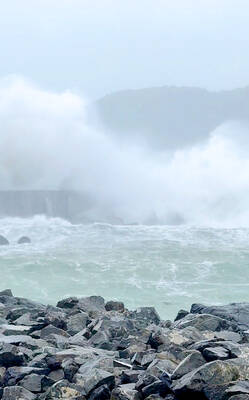A woman disguised in a man's robes and headdress slipped into a line of army recruits and detonated explosives strapped to her body, killing at least six recruits and wounding 35 -- the first known suicide attack by a woman in Iraq's insurgency.
The attack on Wednesday in Tal Afar near the Syrian border appeared aimed at showing that militants could still strike in a town where US and Iraqi offensives drove out insurgents only two weeks ago. A female suicide bomber may have been chosen because she could get through checkpoints -- at which women are rarely searched -- then don her disguise to join the line of men, Iraqi officials said.
Iraq's most notorious insurgent group, al-Qaeda in Iraq, claimed responsibility for the attack in an Internet statement, saying it was carried out by a "blessed sister."
The bombing came a day after US and Iraqi officials announced their forces killed the second-in-command of al-Qaeda in Iraq, Abdullah Abu Azzam, in a raid in Baghdad over the weekend. His death has not slowed insurgent violence, with at least 84 people -- including seven US service members -- killed in attacks since Sunday.
US President George W. Bush warned violence will increase in the days leading up to a key Oct. 15 referendum on a new constitution, a document that has sharply divided Iraq's Shiite Muslim majority and the Sunni minority that forms the backbone of the insurgency.
The US military announced on Wednesday that two more American soldiers and an airman were killed in violence and a Marine was killed by a non-combat gunshot. The deaths brought to 1,929 the number of US service members who have died since the Iraq war started in March 2003, according to an Associated Press count.
In the holy city of Najaf, south of Baghdad, an attacker set off an explosion in the home of a bodyguard of radical Shiite cleric Moqtada al-Sadr on Wednesday, killing two people and wounding five, al-Sadr aides and a hospital official said.
In the attack at the Tal Afar army recruitment center, the female suicide bomber was wearing a traditional white dishdasha robe and a checkered kaffiya headscarf -- both worn only by men -- to blend in with the line of Iraqi applicants, Major Jamil Mohammed Saleh said.
She detonated explosives packed with metal balls and hidden under her clothes, Saleh said. Six recruits were killed and 35 wounded, said hospital officials in Tal Afar, 260 miles northwest of Baghdad.
In a photo of the attacker's head taken by Saleh and shown to reporters, the woman appeared to be in her early 20s with dark eyes, light skin and brownish hair. Saleh said it was not known whether she was Iraqi.
It was the first known time that a woman has succeeded in carrying out a suicide bombing in Iraq since the insurgency began, though it was not the first attempt.
In March, four women, reportedly sent by the insurgent group Islamic Army in Iraq, were caught in a town south of the capital before they could set off explosives belts they were wearing.
General Ahmed Mohammed Khalaf, the regional police chief, said insurgents were exploiting the fact that women are not searched at checkpoints "because of religious and social traditions." Women and children will now be searched at Tal Afar checkpoints, he said.
Still, the attack raised the prospect of more women bombers being used by the insurgency, a tactic difficult to defend against, especially during the referendum. Men and women turned out in large numbers to vote in parts of Iraq during January parliamentary elections, and images of veiled women flashing their ink-stained fingers after voting became an iconic symbol of hopes for democracy.
Major General Hussein Ali Kamal, intelligence head at the Iraqi Interior Ministry, said the Tal Afar attack "rings danger alarms" and requires new techniques, including increased searches of women at sensitive locations.
"But this will be a problem, because women are taking part in our new political life and finding large numbers of female security officers to search them is not an easy process," he told reporters.
In the past, women have played only a supportive role in the insurgency, helping smuggle equipment or feed, shelter and give medical treatment to fighters, said Nora Bensahel, an insurgency expert with Rand Corp, a nonprofit research group based in Santa Monica, California.
"This could be a sign that the insurgency is getting greater support among a larger segment of the population, that women are getting more militant and willing to take on a greater role," Bensahel said. "It could also be a sign that the insurgents are having trouble finding male recruits."

FEROCIOUS FISH-EATER Scientists have found a new species of dinosaur from the Cretaceous Period, a ‘hell heron’ that stalked the rivers, deep in the Saharan desert At a remote Sahara desert site in Niger, scientists have unearthed fossils of a new species of Spinosaurus, among the biggest of the meat-eating dinosaurs, notable for its large blade-shaped head crest and jaws bearing interlocking teeth for snaring fish. It prowled a forested inland environment and strode into rivers to catch sizable fish like a modern-day wading bird — a “hell heron,” as one of the researchers put it, considering it was about 12 meters long and weighed 5-7 tons. The dinosaur presented a striking profile on the Cretaceous Period landscape of Africa some 95 million years ago as it hunted

Heavy rain and strong winds yesterday disrupted flights, trains and ferries, forcing the closure of roads across large parts of New Zealand’s North Island, while snapping power links to tens of thousands. Domestic media reported a few flights had resumed operating by afternoon from the airport in Wellington, the capital, although cancelations were still widespread after airport authorities said most morning flights were disrupted. Air New Zealand said it hoped to resume services when conditions ease later yesterday, after it paused operations at Wellington, Napier and Palmerston North airports. Online images showed flooded semi-rural neighborhoods, inundated homes, trees fallen on vehicles and collapsed

‘COST OF DEFECTION’: Duterte’s announcement could be an effort to keep allies in line with the promise of a return to power amid political uncertainty, an analyst said Philippine Vice President Sara Duterte yesterday announced she would run for president of the Southeast Asian nation of 116 million in 2028. Duterte, who is embroiled in a bitter feud with Philippine President Ferdinand Marcos Jr, was impeached last year only to see the country’s Supreme Court throw the case out over procedural issues. Her announcement comes just days before her father, former Philippine president Rodrigo Duterte, begins a pretrial hearing at the International Criminal Court (ICC) in the Netherlands over crimes against humanity allegedly committed as part of a brutal crackdown on drugs. “I offer my life, my strength and my future

NOT YET THERE: While the show was impressive, it failed to demonstrate their ability to move in unstructured environments, such as a factory floor, an expert said Dancing humanoid robots on Monday took center stage during the annual China Media Group’s Spring Festival Gala, China’s most-watched official television broadcast. They lunged and backflipped (landing on their knees), they spun around and jumped. Not one fell over. The display was impressive, but if robots can now dance and perform martial arts, what else can they do? Experts have mixed opinions, with some saying the robots had limitations and that the display should be viewed through a lens of state propaganda. Developed by several Chinese robotics firms, the robots performed a range of intricate stunts, including martial arts, comedy sketches and choreographed